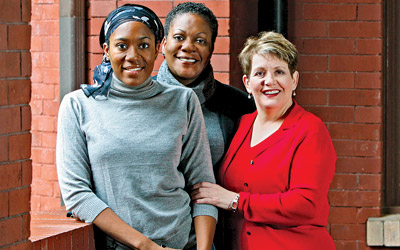|
Heaven on Earth: Reflecting the Kingdom’s Diversity
at SPU
By Sharon Hartnett, Assistant Professor of Education
 |
| Above (from left): Schatzi Miller, Marilyn Miller, and Sharon Hartnett stand in front of SPU’s Peterson Hall. |
One evening while shopping in downtown Seattle, an employee noticed me admiring an outfit on display. “Would you like to try it on?” she asked, smiling. I quickly replied, “No thank you. I’m a teacher, and this brand is too expensive for me.”
Before I could make my way to the sale rack, she stopped me again. “Where do you teach?” she asked. I could see her eyes light up when I said, “Seattle Pacific University.” “That’s where I’d like my daughter to study,” she replied. There, amid the racks of clothing, Marilyn Miller and I had an instant connection.
“We need you with us!” I responded, eager to tell her more about Seattle Pacific, the quality
of our academic programs, and the strides the University is making in the areas of diversity
and reconciliation. “Our vision is for SPU to be a reflection of the diversity in the Kingdom
of God,” I said. During our conversation, it became clear that she shared that vision.
Then she told me about her daughter’s interest in fashion design. I got even more excited, and described Seattle Pacific’s nationally
known apparel design program and the opportunities it could offer her daughter.
She asked if there were scholarships available.
I said “yes” and gave her my card.
Some time later, Marilyn and her daughter, Schatzi, came to campus for a visit.
Now Schatzi is an SPU student, which delights me. As a professor and advocate
of Seattle Pacific’s vision to build bridges in our city, it is a humbling,
joyful experience to cultivate new relationships
with community members.
But it wasn’t always easy for me. When Mark Pitts, former dean of SPU’s School of Education, asked me to chair the Diversity Committee for the School, I was surprised and, I admit, a little worried. Surprised to be offered such an important responsibility.
Worried because I wondered why they would want a white Irish woman to do this important work of recruiting and retaining ethnic
minority students and faculty, and identifying diverse settings for student teaching. Three years later, I can tell you that this job has turned out to be pure, unexpected joy.
Armed with only a heart for social justice, my approach to leading the committee
was to assemble a group of diverse people who could teach me and who would
command respect, including tenured faculty members, staff members, members,
and a state leader in higher education. I asked for a budget and
support from School administration. I wanted people to take this work seriously.
I also scanned my brain for prior knowledge — anything that might help me glimpse the world as minority populations in this country see it. Thinking back to my childhood helped.
I grew up in the Catholic tradition, and when John F. Kennedy ran for office, I remember people remarking openly about their disdain for an Irish Catholic in the White House. Though I didn’t understand the context of these comments, my young mind put two and two together: Being Catholic and Irish were undesirable.
Other experiences such as growing up in a traumatized environment, not having
as much money as others, and being single in a culture that is suspicious of
those who don’t marry, were all windows I could look through to try to imagine what it felt like not to be part of the dominant culture. Of course, these are only small comparisons, but they remind me of what it’s like to feel unwelcome every day.
Biblically, I’m motivated and informed in this work by 2 Corinthians 5:18: “All this is from God who reconciled us to himself through Christ and gave us the ministry of reconciliation.”
I have taken those words to heart. When I go into the classroom or go about the work of the committee, I’m also strengthened by the examples of Jesus, Martin Luther King Jr., and John Dewey, who encouraged and enabled people to reconcile with each other and to create a more democratic coexistence.
I have three siblings and both parents in heaven. My mind and heart go there
often. The more I imagine what heaven must be like, the more I think our mission
is to replicate the same conditions here on earth, through community.
After
all, heaven is a multicultural place. Seattle is a multicultural place. And
thanks to the work of many, SPU is becoming a multicultural
place. It is a privilege to work with
colleagues who share this vision.

Sharon Hartnett is the chair of secondary education
at SPU, as well as chair of the School of Education
Diversity Committee. She holds a Ph.D. from Gonzaga University and has been a member
of the Seattle Pacific School of Education
faculty since 2000.
Back to the top
Back to Home
|
